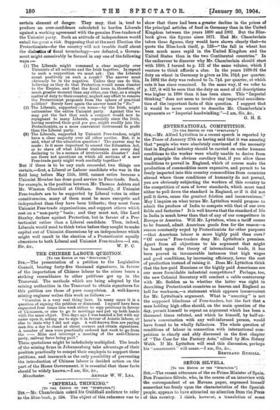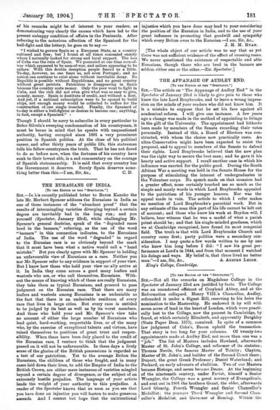SESOR SILVELA.
. [To THE EDITOR OF TER "SPECTATOR."] SIR,—The recent utterance of the en-Prime Minister of Spain, Don Francisco Silvela, who, in the_ course of an interview with the correspondent of an Havana paper, expressed himself somewhat too freely upon the characteristics of the Spanish people, appears to have attracted no attention from the.Press of, this country. .1 think, :however, a _translation of some
of his remarks might be of interest to your readers, as demonstrating very clearly the causes which have led to the present unhappy condition of affairs in the Peninsula. After referring to the notorious affection of the Spaniard for the bull-fight and the lottery, he goes on to say :—
"I wished to govern Spain as a European State, as a country cultured and free ; but I found at all times concealed enmity where I naturally looked for strong and loyal support. The loss of Cuba was the ruin of Spain. We possessed at one time men-of- war which appeared to be men-of-war, and sailors appearing to be sailors. With this double deception people feared us a little. To-day,, however, no one fears us, not even Portugal; and no nation can continue to exist alone without inevitable decay. No Republic is possible without Republicans, and no great country without great patriots. Patriotism is disappearing in Spain because the country costs money. Only the poor went to fight in Cuba, and the rich did not even give what was so easy to give, namely, money. Spain is destitute of credit, and without a fleet. And yet, if a national subscription were to be opened to build ships, not enough money would be collected to suffice for the construction of.one single ironclad. Finally, the Spaniard of to-day is either a bull-fighter or desires to become one; anything, in fact, except a Spaniard." I
Though I should be sorry to subscribe in every particular to Sefior Silvela's sweeping condemnation of his countrymen, it must be borne in mind that he speaks with unquestioned authority, having occupied since 1891 a very prominent position in Spanish politics. At the close of his political career, and after thirty years of public life, this statesman tells his fellow-countrymen the truth. That he has not dared to do so before now, when the fortunes of his country have sunk to their lowest ebb, is a sad commentary on the courage of Spanish statesmanship. It is said that every country has the Government it deserves. Surely Spain deserves some-























































 Previous page
Previous page